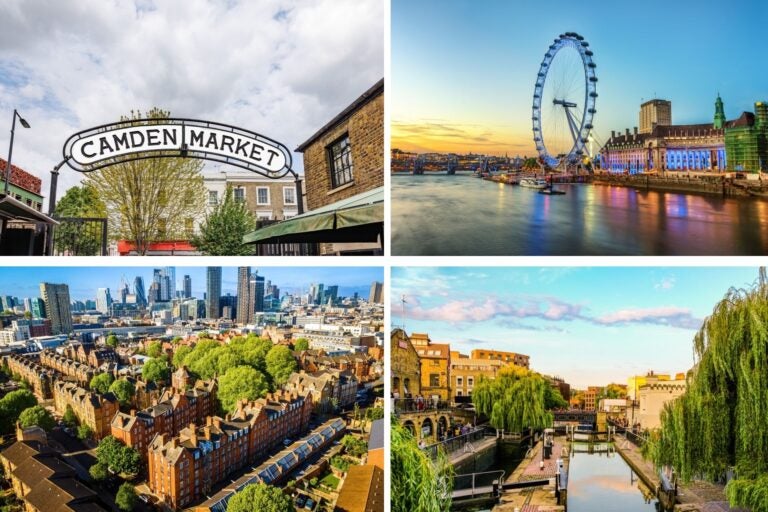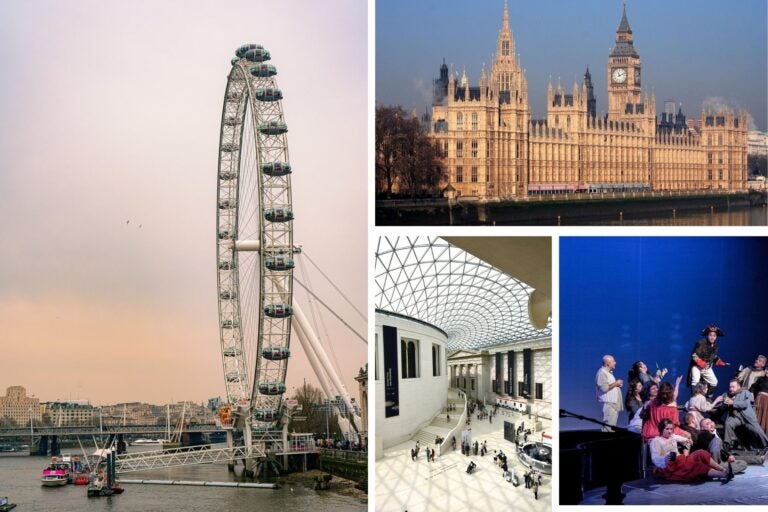Live in London: Advantages, disadvantages and costs
Living in London means choosing one of the world’s top educational and professional hubs. Discover what it’s like to live in London!
London, the UK’s bustling capital with over eight million people, is one of the most multicultural cities in the world. For students, choosing to live in London is an amazing chance to improve English or study at a top university. Digital nomads are drawn to its strong tech scene and coworking spaces, while others choose to live in London for a season simply to experience the city in depth.
That’s why we want to help you discover the most important aspects of living in London, from quality of life, safety, healthcare and education to the economy, internet connectivity and average salaries. We will also look at the advantages and disadvantages of moving to this great metropolis. So, welcome to London!
Quality of life in London
London is known as one of the best cities to live in. High rankings like Mercer and The Economist’s Global Liveability Index reflect this, thanks to top-notch education, advanced technology, and excellent career opportunities. In the following sections, we’ll explore all of these aspects in more detail.
Learn about the London healthcare system
The UK’s National Health Service, or NHS, was established in 1948 and is funded through taxes. It is known for providing universal coverage and treating everyone equally, but how can you access it as a foreigner? Here’s a guide to the steps you need to take.
- European Union (EU) citizens: You need to apply for the European Health Insurance Card (EHIC) in your home country through your local health authority. With this card, you’ll have guaranteed access to medical care.
- Foreigners with long-term visas: Students and workers applying for a visa must pay a health surcharge, known as the Immigration Health Surcharge (IHS). In 2025, this costs around $1,033 for adults
- Non-resident digital nomads: If you are not legally registered in the country, you will need to take out an international private health insurance plan in order to receive care at private clinics.
London’s hospital network is among the most prestigious in Europe, including St Thomas’ Hospital on the South Bank, University College Hospital in Bloomsbury, Royal Free Hospital in Hampstead, and King’s College Hospital in Denmark Hill.
Studying in London
London is a major global center for higher education, known for its renowned, diverse and innovative universities. Many international students choose to live in London to learn English and immerse themselves in the language. Scholarship recipients can also attend some of the city’s top universities, which, according to the QS World University Rankings 2025, include:
- University College London (UCL): One of the most prestigious universities in the country and the world, excelling in medicine, engineering, humanities, and social sciences.
- Imperial College London: It specializes in science, engineering, medicine, and business, and ranks among the world leaders in scientific research and technology.
- King’s College London: Excels in law, health, psychology, international relations, and biomedicine.
- London School of Economics and Political Science (LSE): A global leader in economics, political science, sociology, and international studies.
- Queen Mary University of London: Renowned for its focus on diversity and excellence in areas such as medicine, law, and business.
Since Brexit, the rules for studying in London as an international student have changed slightly. Nowadays, you need to apply for a Student Visa, whether you are from the EU or elsewhere. This application can be completed through the UK consulate or embassy in your country, either in person or online.

Safety in London’s streets
Although London is a large city, it is generally quite safe. According to studies by the Metropolitan Police, crime rates have dropped significantly in recent years. If you’re wondering about the best areas to live in London, neighborhoods like Camden Town, South Bank, Richmond, Hampstead, Greenwich, and Wimbledon stand out for their safety and quality of services.
This is London’s economy and job market
London drives the UK’s economy and ranks among the world’s top financial centers, home to major companies like Barclays, Citibank, Google, Amazon, Apple, and TikTok. While living costs are high, salaries tend to be generous, with the average around $3,370 per month. For English speakers, there is strong demand for qualified professionals in fields such as:
- Technology (web development, data science, and cybersecurity)
- Finance
- Digital marketing
- Healthcare
- Education
- Architecture and design

Internet connectivity in London
Internet connectivity in London is among the fastest and most reliable in Europe, making the city an attractive destination for digital nomads and tech companies. According to the 2024 Ookla Speedtest Global Index, the average download speed is 153 Mbps, with an upload speed of 34 Mbps.
In central areas like Shoreditch, Soho, Canary Wharf, and Southbank, speeds are often even higher, especially in coliving spaces with symmetrical fiber connections and in coworking hubs such as WeWork, TOG (The Office Group), Huckletree, Second Home, Mindspace, and Fora.
The main mobile providers in London, including EE, Vodafone, O2, and Three, offer 4G across the city and 5G in most areas. For even better coverage, Holafly’s monthly plans give you 5G anywhere in London, unlimited data, and the ability to connect two devices at the same time for $64.90 per month.
Important: If you are a frequent traveler and want to stay connected without worrying about expensive roaming or looking for a new SIM at every destination, Holafly’s subscription plans are for you. With a single eSIM, enjoy internet in more than 170 countries for a fixed price and no surprises on your bill. Travel without limits and connect easily and securely! 🚀🌍

Advantages of living in London
If you’re seeking a city full of opportunities for work and study, London is the perfect place to spend some time. It combines rich history, innovation, cultural diversity, and highly skilled job prospects that are hard to find elsewhere. Curious about the benefits? Here’s a roundup of the top reasons that might just convince you to move to the capital:
- Great job opportunities: It’s one of the European cities with the most job opportunities, especially in fields like finance, technology, creative industries, healthcare, and education.
- Multicultural city: Over 35% of London’s residents are from abroad, making it a city known for its open-mindedness and cultural diversity. You’ll find international communities, multicultural events, and restaurants representing cuisines from all over the world.
- Excellent transport links: London’s transport system makes it easy to reach any part of the city safely, whether by underground, train, or bus. The Eurostar also links you to major European cities, and several international airports make traveling abroad convenient.
- Cultural and leisure opportunities: Living in London is anything but boring, with cultural events happening every day. You can explore free museums like the British Museum or Tate Modern, attend concerts and theater performances, or enjoy festivals such as London Pride and BST Hyde Park.

Disadvantages of living in London as a foreigner
So, what are the main downsides of living in London? The biggest challenge is the high cost of living, which can make managing your budget tricky without a good income. Many of the other drawbacks are similar to those in other major European cities. Here’s a closer look to help you make an informed decision.
- Gray and rainy weather: London is known for its cloudy and rainy weather, and if you’re used to a warmer, sunnier climate, it can take a toll on your mood.
- Limited housing: Finding affordable private rental housing in London can be tough due to high demand and limited availability. Landlords often ask for references and a large deposit. One-bedroom apartments typically start at around $2,022 per month.
- Fast pace and long distances: Living in London means keeping up with a fast-paced lifestyle, which can be stressful if you’re used to a quieter environment. Commuting can also take longer due to the city’s size.
- High cost of living: London is one of the most expensive cities in Europe, so living here only really makes sense if you have a skilled job with a competitive UK salary. This will allow you to cover rent, food, transport, and leisure each month while still being able to save.
Frequently asked questions about living in London
Yes, since Brexit, anyone planning to stay in the city for more than six months needs a visa, including specific visas for study or work.
Career opportunities in London depend on your skills and experience. With the right qualifications, jobs in tech, healthcare, finance, or professional services are within reach. For those starting out, options include hospitality, au pair work, delivery, or teaching your native language.
Living in London offers a wide range of job opportunities, excellent educational options, and a rich cultural and leisure scene. On top of that, the city is well connected to other European destinations at affordable prices.
For digital nomads, areas like Shoreditch, Camden, and Clapham offer good connectivity, a vibrant cultural scene, and plenty of coworking spaces. If you’re looking for a quieter atmosphere, Richmond, Wimbledon, or Greenwich are better options.
London’s public transport runs via the Tube, buses, suburban trains, and trams. Fares are usually paid with a rechargeable Oyster card, though you can also pay using a bank card.





 Language
Language 


















 No results found
No results found



